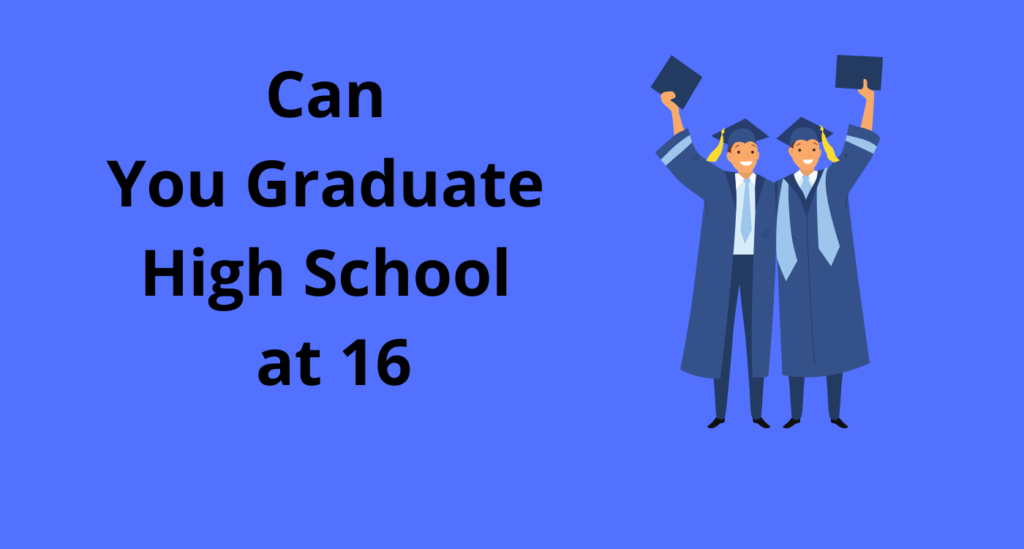A stuents’s educational journey includes a crucial turning point when they graduate from high school. It not only symbolizes the fruit of years of effort and sacrifice, but it also provides access to higher education and a variety of job options which is the minimum to excel is any country you find yourself. But some excellent students might ask whether there’s a way to quicken their academic development and they ask questions like “can you graduate high school at 16?” and leave high school at a young age, like 16. The world is fast revolving and law for education is most countries are also changing to accomodate the reality. In this blog article, we’ll look at the causes of early graduation, the difficulties associated with it, and the options open to students who want to finish high school early.

Factors Influencing Early High School Graduation
The likelihood of a 16-year-old graduating from high school depends on a number of things. Understanding these aspects can help to clarify the viability and difficulties of such a project. Let’s examine a few crucial aspects:
- Academic Readiness: Students that excel in the classroom, have a high level of intelligence, and are highly motivated may have a higher chance of finishing high school early. These students exhibit the ability to handle challenging schoolwork and achieve academic success in any environment they find themselves.
- Credit Accumulation: In order to graduate early, students must earn enough credits in a shorter amount of timefor the courses they ought to take. This could entail enrolling in summer school programs, taking additional courses, or earning credits through different channels like online learning or dual enrollment at a college or university.
- Individualized Education Programs: this case does not apply to all students, some students benefit from personalised education programs that are tailored to their particular learning requirements and objectives. These programs can provide students a customized curriculum, individualized training, and scheduling flexibility, enabling them to advance at a faster rate.
Read Also: Can You Go Back to High School After Dropping Out?
Challenges Of Graduating High School At 16
Although early graduation at the age 16 is an impressive accomplishment itself, it is also important to be aware of the difficulties and factors involved while having to graduate high school at 16. lets examine some challenges that could be faced both during the program and after graduating from high school.
- Developing Social and Emotional Skills: Missing out on the customary social and emotional events that take place throughout the traditional high school years may arise from graduating from high school earlier than usual. The effect on interpersonal connections, peer relationships, and general emotional development must be taken into account.
- College Admission Requirements: Recent high school graduates who intend to enroll immediately in a higher education program may encounter particular difficulties in fulfilling the criteria for admission, especially when they graduate below the age range the college has set. The admission process to some universities may have rigorous age requirements or other requirements that must be satisfied before admittance, making early graduation a less direct route to enrollment.
- Lack of Maturity and Life Experience: Students who graduate from high school at 16 may not have had as much exposure to the responsibilities and experiences of the real world that foster personal development and maturity. It is vital to take into account how this can affect their preparedness for college or other post-secondary endeavors.
Options and Alternatives For Graduating High School At 16
Students who want to finish high school at 16 have a variety of options and alternatives at their disposal when faced with the challenges faced. Let’s explore a few of these routes:
- Personalised Study Plans: Students can create personalised study plans that are in line with their academic objectives and allow them to advance more quickly by working with teachers, counselors, or homeschooling programs. This strategy entails adapting the curriculum to the students’ skills and allowing them to progress through the content more quickly.
- Advanced Placement (AP) and Honors courses: Enrolling in advanced placement or honors classes enables students to push themselves academically while also earning college credits while still in high school. These classes offer the chance to quicken learning and finish high school requirements earlier than expected.
- Virtual Learning and Online High Schools: Virtual learning platforms offer a variety of courses, allowing students to progress quickly and complete their high school curriculum ahead of schedule. Online high schools offer flexible and self-paced learning environments that can accommodate the particular needs of students aiming for early graduation.
- Dual Enrollment classes: Through dual enrollment classes, high school students can get credit for both high school and college courses at the same time. With this choice, students can complete their high school graduation requirements and start their college studies early once they are done.
Conclusion
Achieving high school graduation at the age of 16 is an admirable feat, but it takes serious thought and preparation. Early graduation is made feasible by a number of elements, including academic preparedness, credit accrual, and individualized education plans. However, it’s crucial to consider the difficulties, prospective costs, and effects on college admissions of missing out on conventional high school experiences. Students can attain their aim of an early graduation by looking into choices such as advanced placement classes, dual enrollment programs, online learning, and personalised study plans.Students, parents, and instructors must work together to make sure the choice fits with the student’s overall development and long-term goals. Graduating from high school at the age of 16 can be a remarkable accomplishment because it gives pupils a head start in pursuing further education or other career pathways.








